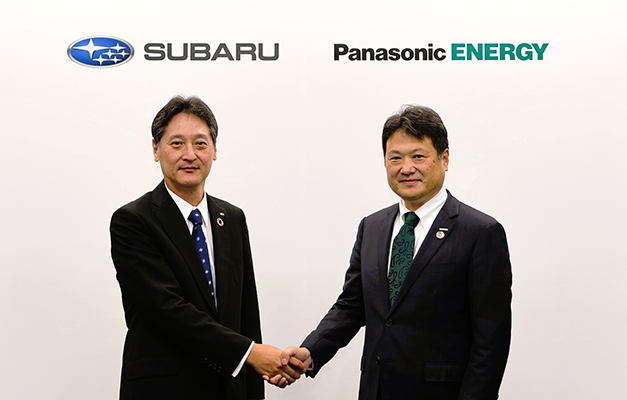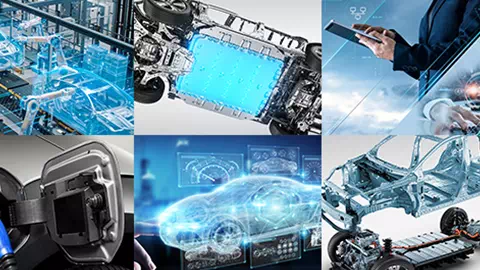Subaru and Panasonic Energy to Begin Preparation for
Supply of Automotive Lithium-ion Batteries and
Joint Establishment of New Battery Factory in Japan
Japan’s battery manufacturing base and accelerate EV adoption
Subaru Corporation
Panasonic Energy Co., Ltd.
Tokyo and Osaka, Japan, September 6, 2024 - Subaru Corporation (“Subaru”) and Panasonic Energy Co., Ltd. (“Panasonic Energy”), a Panasonic Group Company, today announced plans to prepare for the supply of automotive lithium-ion batteries and joint establishment of a new battery factory in Oizumi, Gunma Prefecture, Japan. Panasonic Energy will supply its next-generation cylindrical automotive lithium-ion batteries for the battery electric vehicles (BEVs) Subaru plans to produce from the latter half of the 2020s. This follows their conclusion of a basic cooperative agreement and reflects their aim of establishing a medium- to long-term partnership.

Subaru has set a goal of having 50% of its 1.2 million global sales in 2030 be BEVs and, in conjunction with Panasonic Energy, will address the expanding demand for BEVs and automotive batteries. As part of this collaboration, Panasonic Energy will produce and supply cylindrical lithium-ion batteries at its Suminoe factory in Osaka from fiscal 2027,1 and at the new jointly established lithium-ion battery factory in Oizumi, Gunma Prefecture from fiscal 2028.1 Subaru plans to install these batteries in its BEVs. The annual production capacity for battery cells at the two domestic bases above for this project is planned to reach 20GWh by 2030, significantly increasing Panasonic Energy's domestic production capacity.
The Japanese government has strategically positioned storage batteries as a key asset of achieving carbon neutrality by 2050, and is working to expand the domestic battery supply chains and improve industrial competitiveness. Through this collaboration, Subaru and Panasonic Energy are poised to contribute to the strengthening of the domestic supply chain for cylindrical automotive lithium-ion batteries, while also expanding and enhancing Japan's manufacturing base. Furthermore, the initiative to increase battery production and develop battery technology as part of this partnership was approved by the Ministry of Economy, Trade and Industry on September 6, as part of its plan for establishing a stable supply of batteries.
Atsushi Osaki, President and CEO of Subaru, said, "Subaru is accelerating its efforts toward electrification to contribute to the realization of a carbon-neutral society. With a history of manufacturing that spans over 100 years, both Subaru and Panasonic Energy will continue to enhance their world-leading competitiveness and create the next 100 years of history."
Added Kazuo Tadanobu, President and CEO of Panasonic Energy, "Through this collaboration, we are poised to drive the expansion of EVs and boost the competitiveness of Japan’s battery industry. Our ultimate goal is to foster a sustainable society, and we are dedicated to achieving this mission."
Approved Lithium-ion Battery Supply Plan by the Ministry of Economy, Trade and Industry
| Production item | Cylindrical Automotive Lithium-ion Batteries |
| Production capacity | 16GWh per year (by 2030) |
| Total investment | Approximately 463.0 billion yen |
| Subsidy | Approximately 156.4 billion yen (maximum) |
| Activities | Establishment of production infrastructure; development, introduction, and enhancement of production technology |
The above subsidy amount does not include the investment/subsidy being provided for the 4GWh to be produced at the Panasonic Energy Suminoe factory.
1 In this press release, fiscal years are referenced by their starting year. For example, fiscal 2027 refers to the fiscal year commencing April 2027.
###
Related News Release
-

Corporate & Financial Subaru and Panasonic Energy Agree to Cooperate in Supply of Cylindrical Automotive Lithium-ion Batteries (March 19, 2024) -

Subaru and Panasonic Energy Start Talks to Build Medium- to Long-term Partnership for Supply of Automotive Cylindrical Li-ion Batteries (July 31, 2023)


